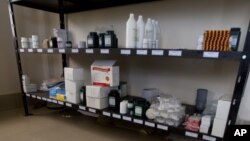Quick Facts About Malaria
Quick Facts About Malaria- About 3.3 billion people, half the world's population, are at risk of malaria.
- People living in the poorest sub-tropical and tropical countries are the most susceptible.
- Caused by mosquito-borne parasite.
- Most of nearly 800,000 annual deaths are among African children under five.
- Kills by restricting blood flow to vital organs.
- Symptoms include fever, headache and vomiting.
The report by the U.S. National Institutes of Health says an analysis of data collected from 21 sub-Saharan African nations discovered that 35 percent of anti-malarial drugs failed chemical testing because they were poorly manufactured, while another 20 percent were bogus.
In a similar analysis of various anti-malarial drugs collected from seven southeast Asian nations, the survey says 35 percent failed chemical testing, nearly half were incorrectly packaged, and another 36 percent were fake.
Researchers say the problem could be much worse, with many cases going unreported and patients buying drugs without prescriptions and self-medicating.
More than three billion people around the world are at risk of contracting malaria, which kills as many as one million people each year, many of them infants and children in Africa.
Scientists say the use of the fake or poor quality anti-malaria medicines, may contribute to drug resistance, already seen among patients living along the Thai-Cambodian border.
The NIH study says more testing needs to be conducted in China and India, two nations which are suspected of manufacturing the counterfeit anti-malarial drugs.
Some information for this report was provided by AP, AFP and Reuters.





